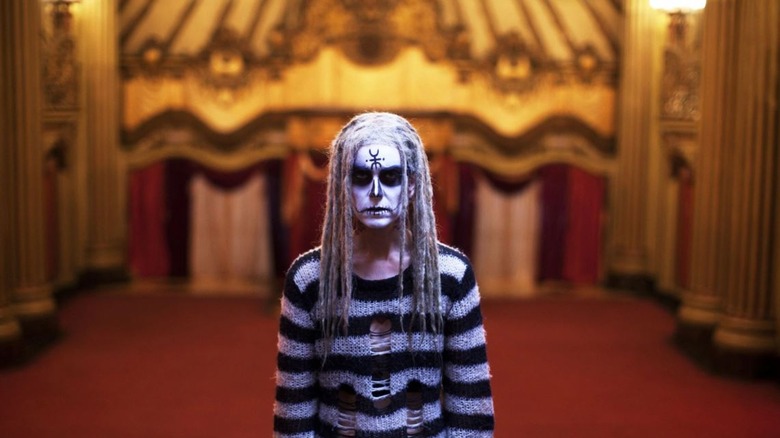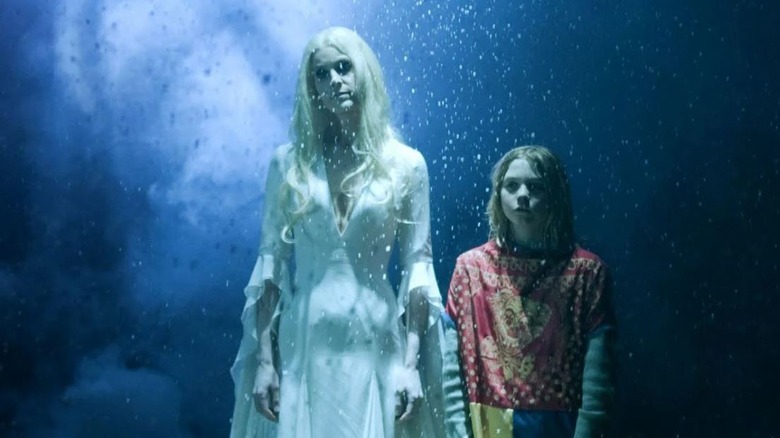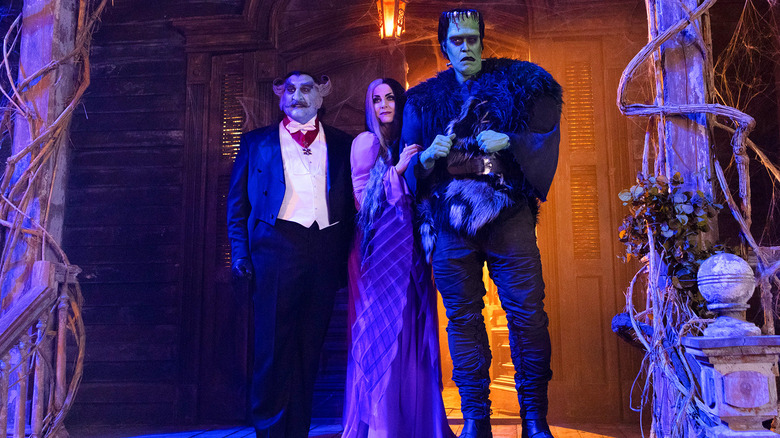Story Is Secondary When It Comes To A Rob Zombie Horror Film
Whether through film or the written word, the importance of visuals cannot be dismissed. Both mediums require us to paint images for the audience to consume and explore. The more memorable the visual image conjured up, the deeper it will embed itself in a person's mind, even years later.
That said, when it comes to film, story is often sacrificed for the sake of strong visuals. That isn't necessarily a bad thing, since film is a visual medium. Images have captivated since the early exploration of filmmaking, leading to the experimentation of still photography, the development of the chronophotographic gun in the Victorian era, and laying down the foundation for the silent film era. While decades have gone by and film has evolved in the realms of audio, performance, and storytelling, the visuals are still the biggest selling point for audiences.
That's why it's no surprise that in his own filmmaking, Rob Zombie focuses on visuals over narrative, as he shared with Complex in a discussion about "Lords of Salem." Say what you will about his movies, but each has had a strong visual imprint that dares not to leave a viewer's brain. Like many of us, though, there's the question of how to bring the things we picture to life. Seriously, it's the bane of any creative's existence and fuels our existentialist thought processes. In the case of Zombie, sometimes it just smacks him in the face and he has to ride the wave from point A to point B.
No copycats allowed!
As far as sparking the imagination, Rob Zombie's life has provided much for the director to pull from over the decades. His love of horror was fostered by many nights in front of the TV screen catching up on all things spooky. His family's work in a travelling circus has directly impacted the director's artistic approach in both his music and films, with the most obvious example being his debut, "House of 1000 Corpses."
Taking up the mantle of music video director in the '90s was easily the best training ground for visuals Zombie could have. Music videos are walking advertisements to titillate the visual sensibilities of a listener. The more striking the image, the likelier someone might be to snatch up an album even if the single was so-so. The current lack of memorability in visual mediums is an issue of contention with Zombie and, as he explained, what drives him in filmmaking:
"Once a movie like 'Paranormal Activity' comes out and becomes popular — and that's a totally fine and valid movie — everyone starts copying it. Everything becomes a found-footage movie that looks like somebody shot it with their phone. The art of moviemaking seems to get thrown away. The cinematography is gone, and the look of everything becomes of little importance. You lose the memorable images; everything looks like it's been shot at night with a security camera. That was one of the things I wanted to bring back: that sense of memorable imagery in a horror movie."
It's all in the mind
Rob Zombie doesn't make the process easy for himself or others, though. The process for him, as he explained, all begins in the mind. However, bringing the images to life is a challenge that Zombie thinks about in the process, especially since he tends to work with smaller budgets. "If you have a lot of money," he told Complex, "you know that you can make almost anything happen, but with a smaller budget you don't have a lot of time or too many resources, so you have to conceive things in a very simple manner and make them happen fast."
Bigger budgets are not without their sacrifices, though. With his upcoming new film "The Munsters," Zombie did have to compromise his vision somewhat when it came to adapting the familiar characters to the big screen. As he shared with Entertainment Weekly, he knew that if he demanded the black and white aesthetic of the '60s sitcom, the film wouldn't have been made. Focusing on hyper-real colors instead helped the director bring a cartoonish-type quality that made the process more exciting for the director.
While story should be just as important as visuals, no one can deny the care Zombie takes in crafting visuals that drill themselves into our skulls. He never loses focus away from what matters to him in the creative process and, while his films often polarize viewers, there's definitely something to be taken away about sticking to your guns.


